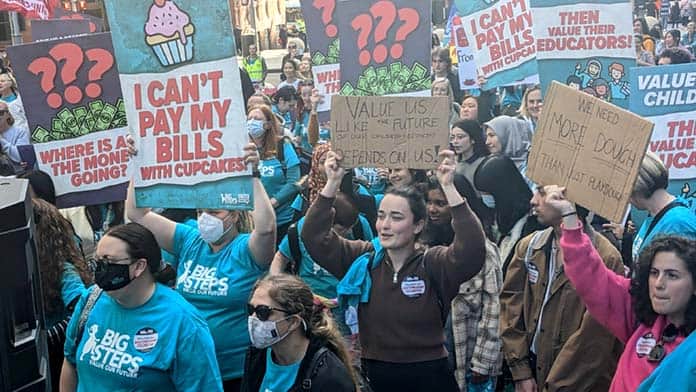After campaigning since 2018, Early Childhood Educators (ECEs) are winning recognition at last for their essential contribution to society. Much more is needed, starting with pay but also conditions.
The childcare sector is in crisis.
Staff shortages leave children in danger and staff with burn-out. Workers love their job but are forced to work in intolerable conditions, so many just leave.
Members of the United Workers Union (UWU) have been fighting for a 25 per cent pay rise to deliver a rate equal to that of similarly skilled male workers in other industries. They are the 13th lowest paid sector in Australia.
“ECE is traditionally ‘women’s work’,” Nicki, a UWU workplace delegate working in a Melbourne centre, told Solidarity.

“Our role in society is diminished like every other ‘background’ worker who goes unnoticed and unvalued. Unlike other feminised sectors, such as nursing and social work, which have had stronger union fight backs. ECE has been left behind.”
Union members were planning a walkout of centres on International Women’s Day (IWD) this week.
“The walkout was proposed as a measure ‘In response to ongoing inaction on low wages in the sector,’” Nicki said.
“It was called on IWD (8 March) to connect our struggle to the historical (and current) struggle for equal pay and conditions to our similarly qualified male counterparts.”
But UWU campaign officials acted to call off the action last week—drawing anger from many union activists.
Collective power
With the sector divided into small, isolated centres, the UWU is using new multi-employer bargaining laws to try to negotiate a pay rise with employers and the government.
“This is allowing us to use our collective power in a way that we’d never be able to use as workers negotiating with small businesses,” Nicki said.
“It can be very useful to help workers in lesser organised workplaces build collective power and fight alongside more organised places.”
Since the sector relies on government funding through childcare subsidies, the union is looking to the government to fund pay rises.
According to UWU officials, “At the latest Multi Employer Bargaining meeting on Friday 23rd February, significant progress was made on the Federal Government funding a wage increase.”
The union says now that the government has come to the negotiating table, “we made ‘progress’ and now we need to back off,” as Nicki put it.
But many union activists wanted to continue with the action on IWD.
“On Tuesday early afternoon, the Big Steps Campaign called an ‘Urgent Leaders Meeting regarding the MEB’ for Tuesday evening … This was a cross country Zoom meeting, with approximately 100 people from across the country.
“The first part of the meeting was a lot of pro-Labor praise and a ‘discussion’ about how Labor had committed to funding a pay rise in early childhood. There was no indication what that commitment was, when it would be announced, if it was anywhere near our demands.”
Anne Aly, Minister for Early Childhood Education, was even brought in to address the meeting.
“The chair went to quickly call a vote about postponing the walk out… as we ‘only had 15 minutes left and it was already quite late’. It became very clear that we were there to rubber stamp their decision—there had been no overt talk of postponing or cancelling before this and it was easy to see that people were confused.
“Members pointed out that it would be incredibly difficult to sell this idea to the membership at their centres, that we had done work with parents to make sure that as many as wanted to could walk out—some parents were excited to bring their children and support us. We talked about the feeling of being railroaded.
“Towards the end the organisers were scrambling to take back control—they proposed 24 hours for us to go back to our centres and talk with our membership and get their opinions. We took this as a win—this was a real culture change—members having a voice, a real voice, and active debate.
“Meeting number two was on Wednesday… it was smaller, and more tightly controlled. Several people who had been in the meeting on Tuesday, and openly dissenting, were not present.
“They again held a report back from Bargaining Delegates, as well as from Goodstart Early Learning Delegates who had lobbied in Canberra that day. Then we again went to a vote—with no dissenting voices heard.
Vague promise
“There was a discussion about what ‘we could do on the day instead’—ideas included inviting our local MP to the centre and morning teas. They also changed the parameters of the vote—taking it from a straight Yes/No to Walk Out, Organise Local Actions or Cancel the Day. Walk out received 15 per cent of the vote, local actions (whatever that means) got 62 per cent of the vote.
“There was a vague promise of Labor funding a pay rise, and that it was still being worked through. They’re obviously in negotiations for the budget in May, but this was incredibly vague.
“There were some obvious hope that Labor was finally coming through, and there was some well-earned cynicism at the promise that commits to nothing. Mostly there were a lot of educators who were tired of decisions being made for them rather than with them. And on the second night those voices were silenced or curtailed. I think that’s what a lot of the anger is about.
“This was not a democratic decision; and this is not how trade unionism is meant to work.
“We’ve been fighting for higher wages since I joined the sector and union in 2018. That campaign flowed into the May 2022 Federal Election. Again, there was a lot about ‘voting Labor’ to change our conditions.
“In September, they launched the ‘Setting the Standard’ campaign, which saw a walkout on Early Educators Day in early September. A couple weeks later, the government announced cheaper childcare, without mentioning anything for educators.”
The union’s top down approach undermines the rank-and-file involvement that will be crucial to building a campaign to win a pay rise from the Labor government.
Rank-and-file members need to pressure the officials to call the action that is needed, and to keep organising to fight for the pay they deserve.
They have no choice.
By Judy McVey






